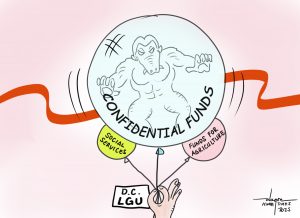As we had been doing over the last many years in our lives our family attended mass last Sunday. While we have already heard about the Catholic Church’s pronouncement of making some adjustments in some church practices during masses, it was only last Sunday that we heard it officially. We mean the pastoral letter from the head of the Archdiocese of Davao, Msgr. Romulo Valles read before the faithful prior to the start of the mass, reiterated by the priest-celebrant before proceeding to read the Gospel, and repeated before the churchgoers went out of the Church after the mass.
The adjustments in some practices during mass is the Church’s way of manifesting its support to the government’s efforts to prevent the spread of the Corona Virus Disease 2019 (COVID-19) that started and still is creating havoc in China due to the number of afflicted as well as those who died because of the illness. So massive is the affliction that the World Health Organization (WHO) has already declared the COVID-19 a global health emergency. As of the last count there were already over 1,700 deaths and more than half a million people reported to be infected by the deadly virus not only in China but in many other countries of the world..
Unfortunately for the Philippines, it is one of the Asian countries that registered some cases of the illness. And many think it is a natural. Why, because the country has been hosting over the years of large number of tourists from China. In addition, many Filipinos also include China, specifically the more developed of that country’s provinces and territories, as destination of our own travellers and those seeking overseas employments.
Thus, our government’s Department of Health (DOH) has already reported of several persons under investigation (PUIs) because they had the misfortune of getting near or having close physical contacts with some tourists, mostly Chinese or those who have China as their last itinerary before proceeding to the Philippines.
Luckily for our country, those persons discovered positive of the CoViD 2019, brought and treated by our hospitals, were Chinese tourists. The one who was confirmed to have died because of the illness was also a Chinese.
The latest advisory from the WHO that brought Philippine health authorities on their toes is the one that says there is possibility of local transmission of the disease. Meaning, there may be some persons who got the virus after they got near or may have some kind of physical contacts with the Chinese carriers of the virus but did not bother to report the same to any government health personnel. And this is very likely because of fear of the long period (14 days) of being quarantined.
Because of the said advisory the DOH with the support of other government agencies as well as the local government units, called on every institution and the Filipinos in general, to refrain from holding activities that are expected to converge huge number of people in one particular place.
Of course, masses and other forms of religious services are known traditional gatherings of people done with regularity ranging from daily to weekly. In the case of daily masses of the Catholic Church, practices during the celebration include the dipping of fingers in the holy water stocked in receptacles right at the church door area, the handholding among mass goers during the prayer of Our Father, the hand shaking and hugging by some of the mass goers during that portion of the peace offering, and the kissing of the priest’s hand after the celebrant gets down from the altar when the mass is ended.
There are however, some avid devotees to certain saints who make it their ritual to visit statues of the center of their devotion that are encased in glass displayed in certain areas inside the church. Some of the statues though stand opened for every churchgoer to pay homage to. Devotees however converge to the statue of the object of their devotion. They touch the encasement and wipe the glass with their handkerchiefs that they also wipe on some parts of their body immediately after. We also personally have witnessed many of the devotees kissing the glass casement.
Now, as far as the pastoral letter read last Sunday we only heard the temporary prohibition of the following practices: the holding of hands by the faithful during the praying of the “Our Father,” the hugging or kissing and handshaking during the peace offering among the mass goers, and the kissing of the priest’s hand after the mass that is normally done by children and a few adults.
We have not heard of any protocol on the dipping of fingers in the holy water inside receptacles upon entering and going out of the church after the mass. There was also no mention as to what to do in order to prevent, even if temporarily while the COVID-19 illness is still prevalent, the faithful from their ritual of kissing, touching and wiping with their handkerchiefs the glass casement of the statues of saints they claim to be strongly devoted to.
Personally, we believe that making no precautionary measures involving the two traditional religious practices among catholic faithful could easily negate the positive effects that may be brought about by refraining from hand holding, handshaking, hugging among churchgoers, and kissing of the priest’s hand.
Yes we agree that such practices among us people who believe in God Almighty and whose belief is manifested in our adherence to the ways being made to follow by the religion we belong have evolved into such solid traditions. Thus, all these cannot easily be done away with. These have become part of our daily lives.
But then, what are our Church leaders for? They are there to lead the Church; the faithful. They may not be able to effectively change long standing traditions outright. But for certain they can stop, even if temporarily, certain practices if the end objective of such mandate is for the good of the Church followers and Christ’s believers.
Without followers there is no Church; without believers there is no religion. And even if there are followers but they are likely afflicted with COVID-19, or are highly vulnerable to the illness, then the Church may also be destabilized and could be infirmed if its leaders remain fence sitters and negligent in helping prevent the contagion.


